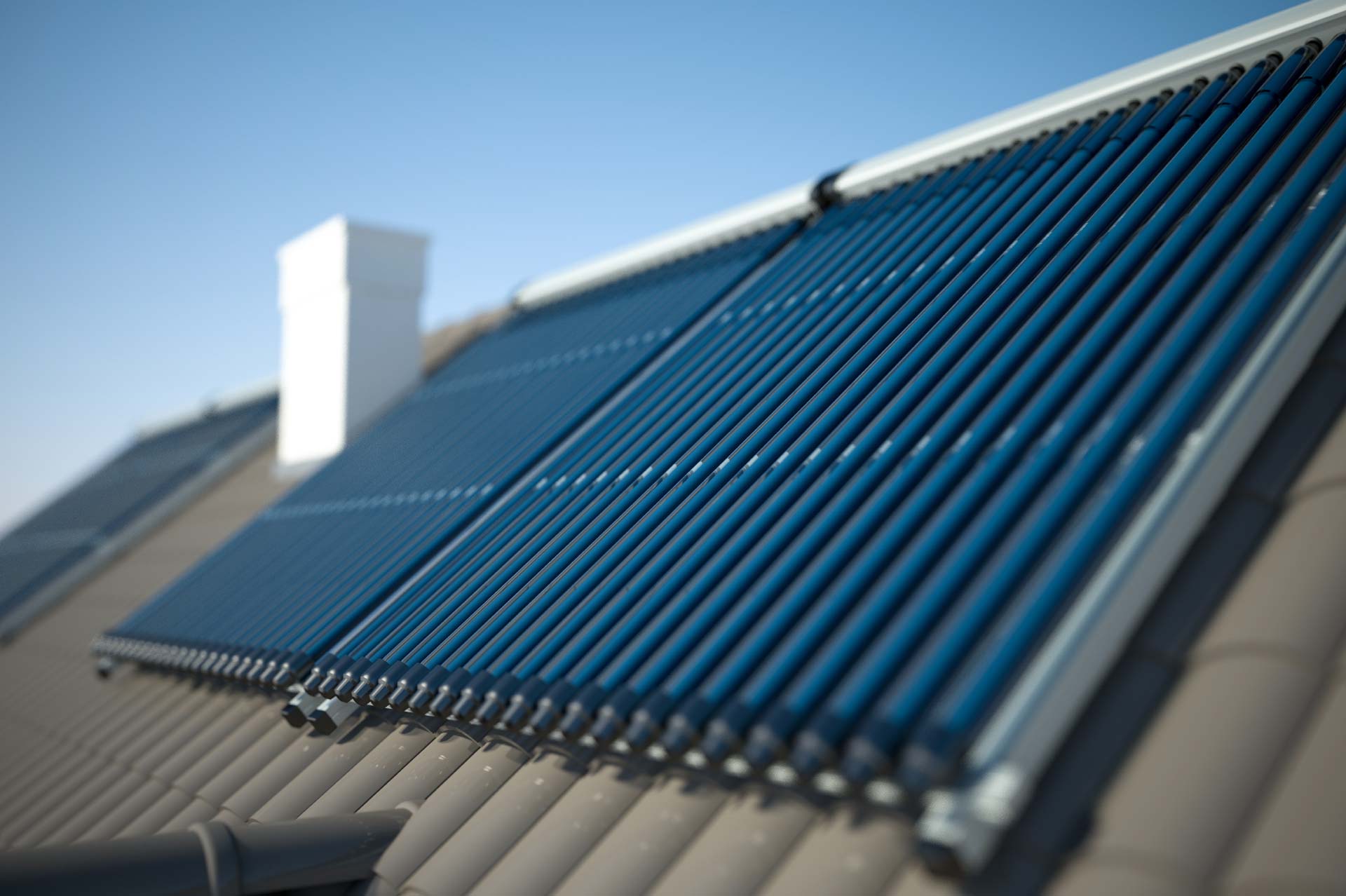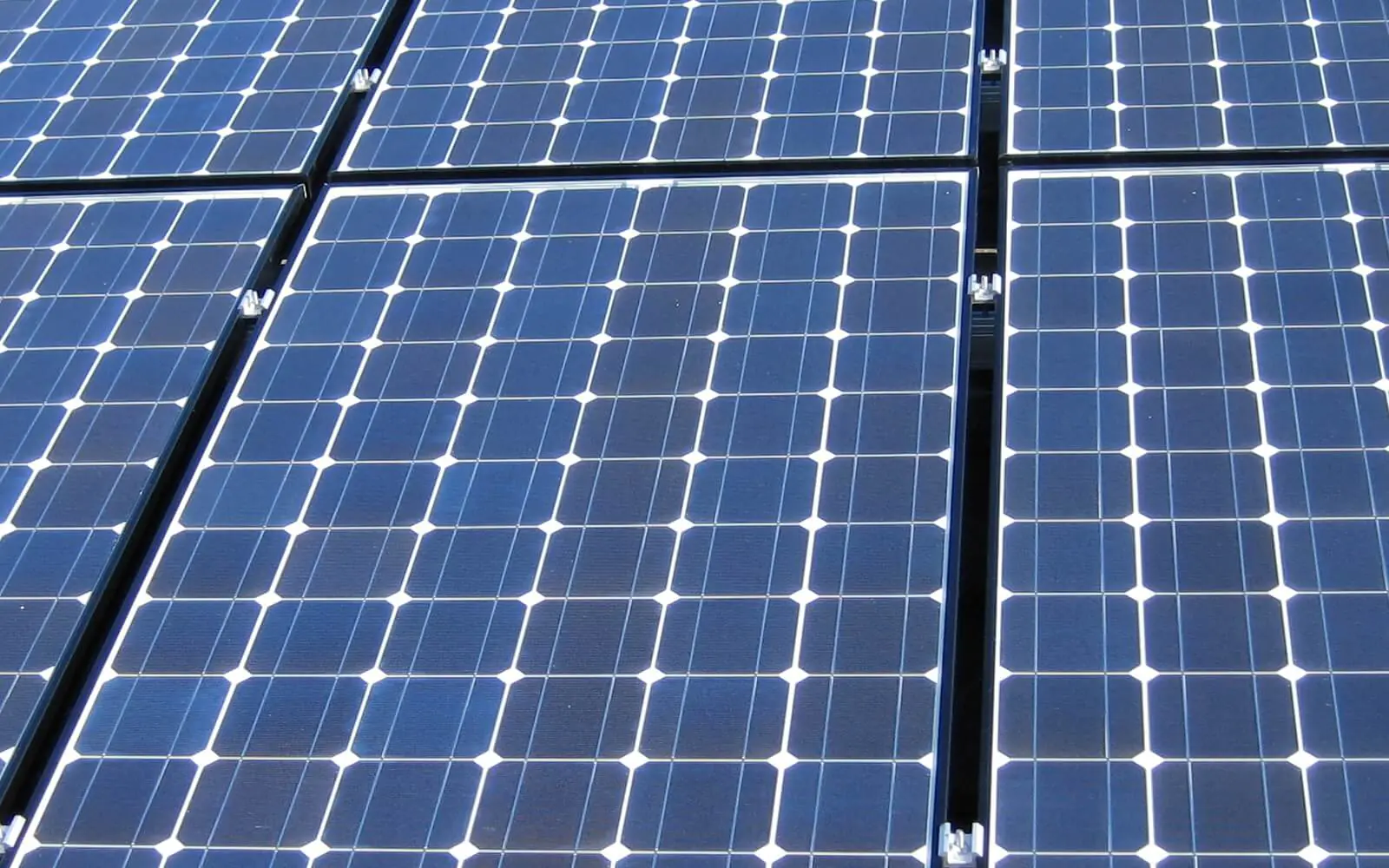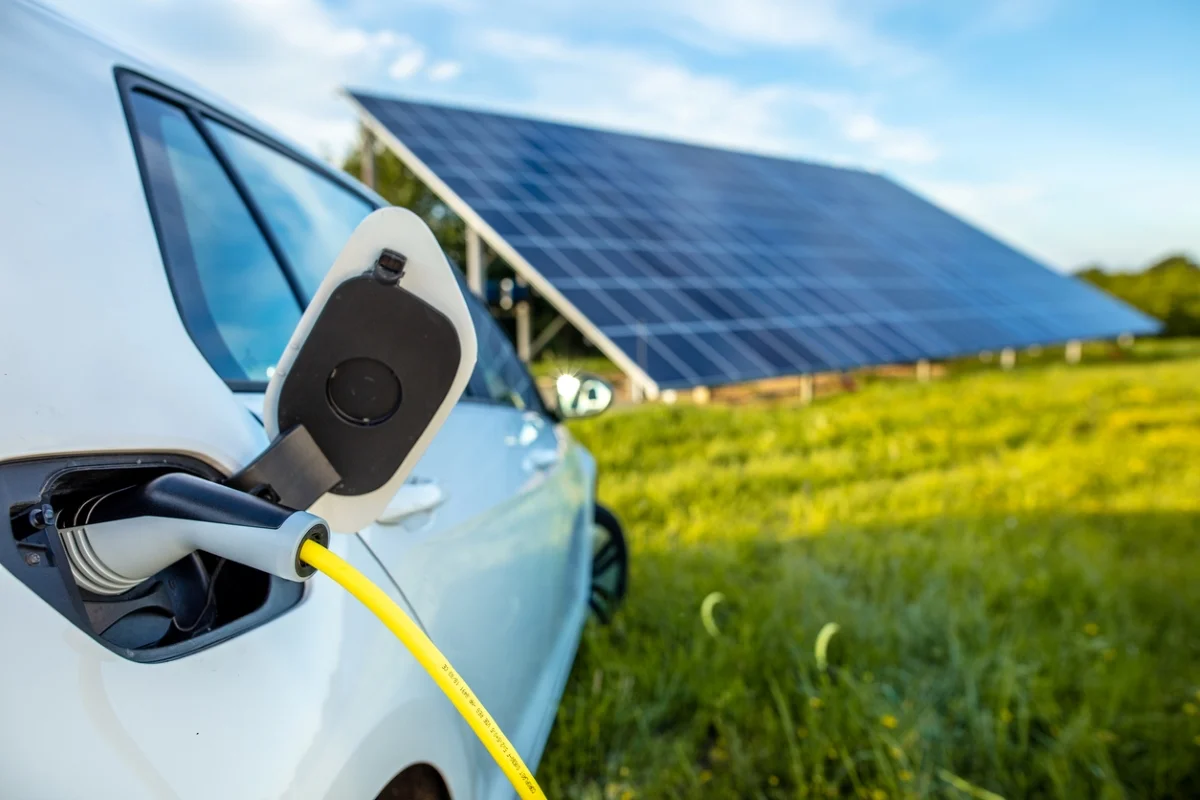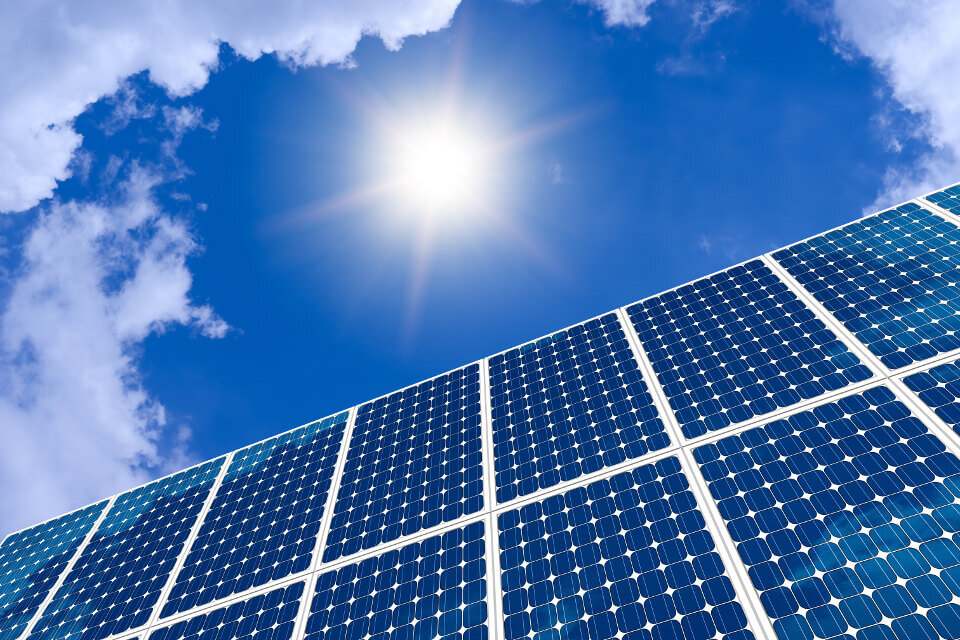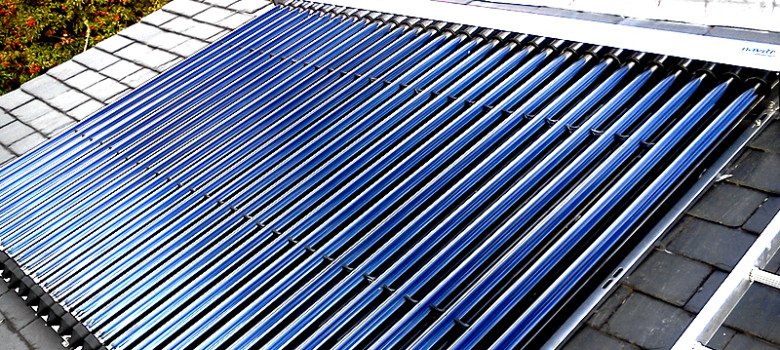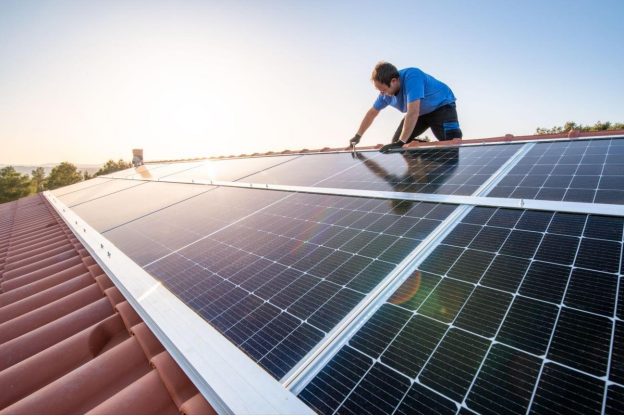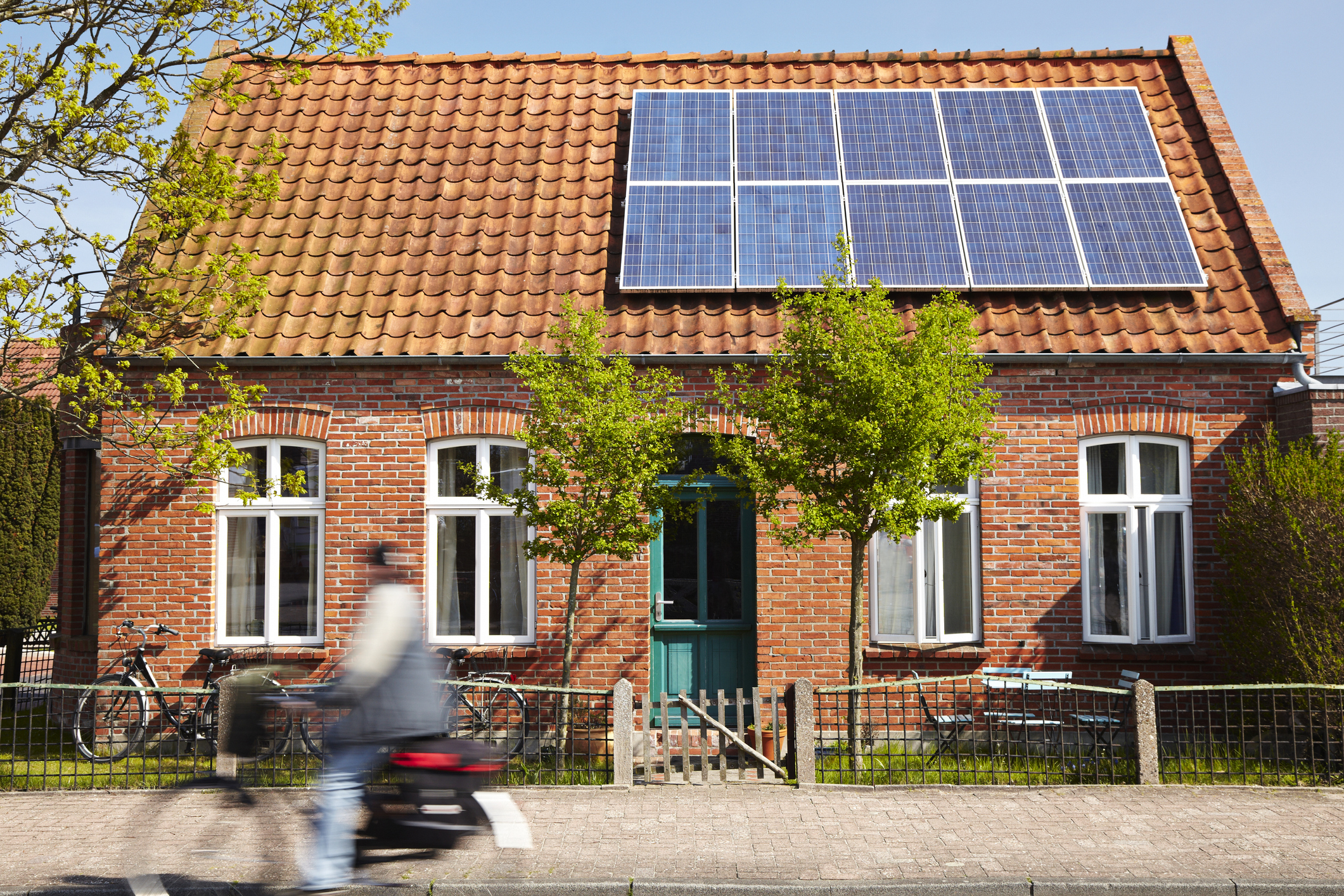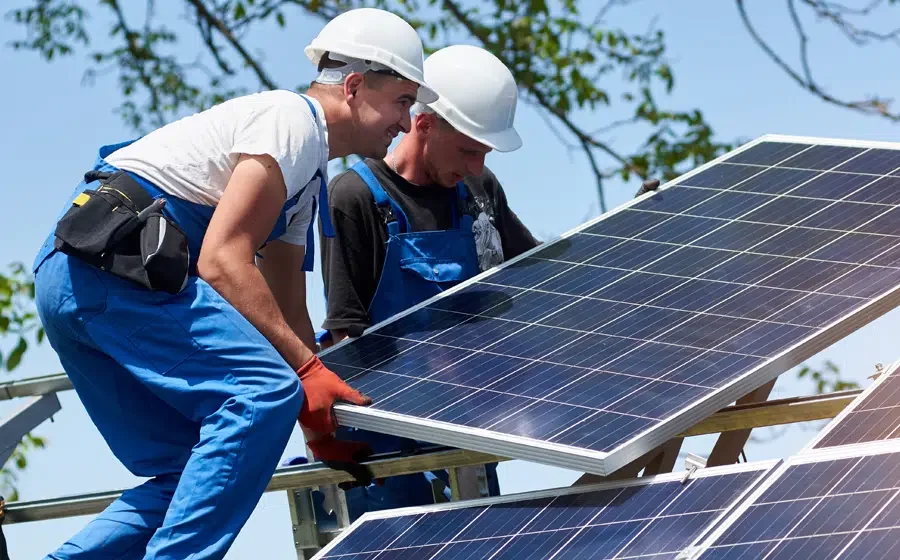- One 350W solar panel costs £786, on average
- A three-bedroom house's solar panels will typically cost £7,860
- Solar panels will reduce your electricity bills by 64%, on average
The average price of a 350W solar panel is £786 as of 2023, though this can vary depending on the quality of the panels, the size of your array, and your location.
For a typical three-bedroom household, a 3.5 kWp system is needed, which has an average cost of £7,860, covers approximately 20 square metres of your roof, and can reduce your electricity bill by 64%.
Below are the average costs and savings associated with solar panels for different types of households.
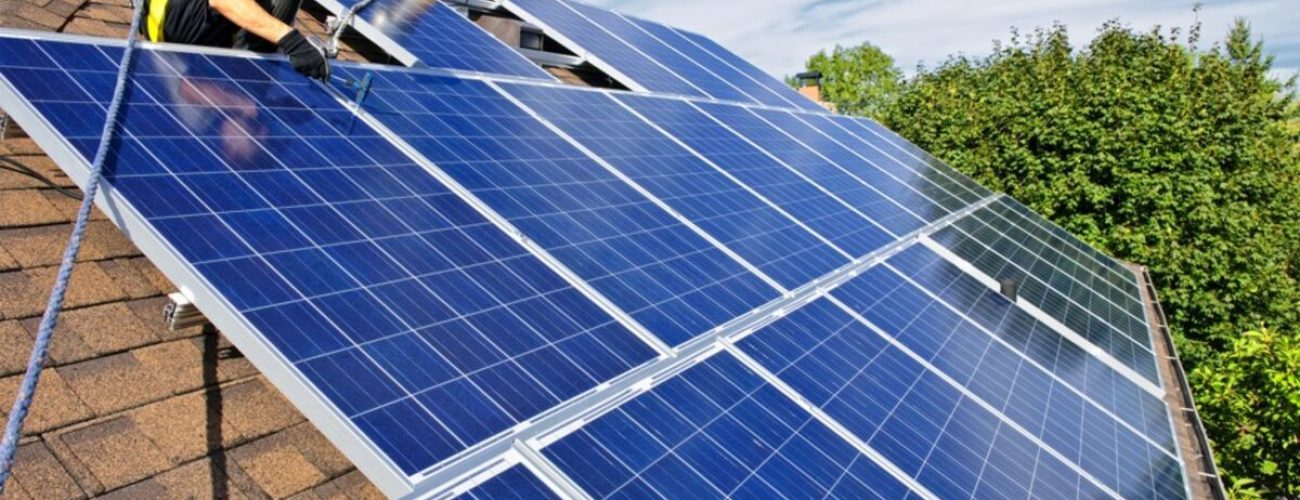
What's on this page?
Cost of solar panels for different house sizes
| Property size | Annual electricity usage | Number of solar panels | Average cost* | Total annual savings |
|---|---|---|---|---|
| 1 bedroom house | 900 kWh | 3 | £2,358 | £167 |
| 2 bedroom house | 1,800 kWh | 6 | £4,716 | £334 |
| 3 bedroom house | 2,900 kWh | 10 | £7,860 | £557 |
| 4 bedroom house | 4,300 kWh | 14 | £11,005 | £780 |
* Please note these prices are based on Microgeneration Certification Scheme (MCS) cost data (March 2023), the average price of electricity (July-September 2023), and Ofgem’s latest typical domestic consumption values (2021). Total costs may increase with more complex installations. The above estimates do not include the cost of a solar battery.
This presents the optimal opportunity in history to acquire solar panels.
The expense of transitioning to solar power has decreased by 82% since 2010, while the cost of electricity has risen significantly. Consequently, solar panels now have the potential to reduce your energy bills by an average of £520 per year, leading to substantial savings, particularly during an energy and cost of living crisis.
With over 1.3 million UK households utilizing solar panels, the average household can recoup their initial investment in just 15.1 years, resulting in a minimum of 10 years of pure profit.
Furthermore, it is uncomplicated to compare solar panel prices with our assistance. Simply provide a few quick details, and our expert installers will furnish you with complimentary quotes for comparison.
What’s the average cost of solar panels?
The average expense for a 3.5 kilowatt-peak (kWp*) solar panel system is £7,860, which is usually the recommended size for a three-bedroom household.
On average, solar panels cost approximately £2,246 per kWp.
For households with one or two bedrooms, a 2.1 kWp system is typically required, with an approximate cost of £4,700.
For those residing in a four or five-bedroom household, the cost for a 4.9 kWp system is around £11,000, based on data obtained from the MCS.
While higher-quality panels come with a higher cost, their enhanced efficiency and power enable your home to generate more electricity, provided they are maintained clean.
Our CO2 savings are calculated using Energy Saving Trust data, while the amount of solar electricity generated is sourced from European Commission figures.
* kWp stands for ‘kilowatt peak’. It’s the amount of power that a solar panel or array will produce per hour in perfect conditions.
kWh means ‘kilowatt hour’, and is a unit of measurement used to explain how much energy your solar panels generate and your home consumes.
Solar panels for residential use are currently more affordable than ever on a global scale.
In 1975, the cost of adopting solar power for a household was approximately £84 per watt, equating to a staggering £294,000 for an average 3.5 kWp system, as reported by the International Energy Agency.
By 1990, this expense had dropped to £6.30 per watt, and by 2000, it decreased further to £4 per watt.
In 2010, the cost reduced even more to £1.75, and the positive trend continued into 2020, with the price of solar panels reaching 16p per watt.
The decline in solar panel costs can be attributed to reduced material expenses, a more established and efficient delivery chain, and the industry’s shift toward increased mass production.
The cost of adding a solar battery
| Property size | Annual electricity usage | Number of solar panels | Battery size | Solar-plus-storage system cost |
|---|---|---|---|---|
1-2 bedrooms | 1,800 kWh | 6 | 4 kWh | £9,716 |
3 bedrooms | 2,700 kWh | 10 | 8 kWh | £16,860 |
4+ bedrooms | 4,100 kWh | 14 | 9.5 kWh | £22,005 |
A solar battery is a device designed to store surplus electricity, including the energy produced by your solar panels, for later use or potential sale.
By utilizing a solar battery, you can typically leverage an additional 30% of your solar energy, leading to an average annual savings of £122 and a further 15% reduction in your carbon footprint, equivalent to an extra tonne of CO2 annually.
The average cost of a solar battery for a three-bedroom house is £4,500.
For smaller residences, the typical expenditure to incorporate a solar battery into a solar panel setup is around £2,500, while larger homes generally invest £8,000 for this addition.
The larger the battery, the greater its electricity storage capacity and associated benefits, but naturally, this comes with a higher cost.
Furthermore, the expense of integrating a solar battery into a solar panel system means that the average three-bedroom household will require an additional 11 years to recoup the entire installation cost.
For a more comprehensive understanding of this technology, please refer to our guide on solar battery costs.
How much money will you save with solar panels?
The typical three-bedroom household in the UK can anticipate an annual saving of £520 on their electricity expenses by employing a 3.5 kWp system comprising 10 solar panels.
The following infographic illustrates the potential savings households of varying sizes can achieve through the use of solar panels.
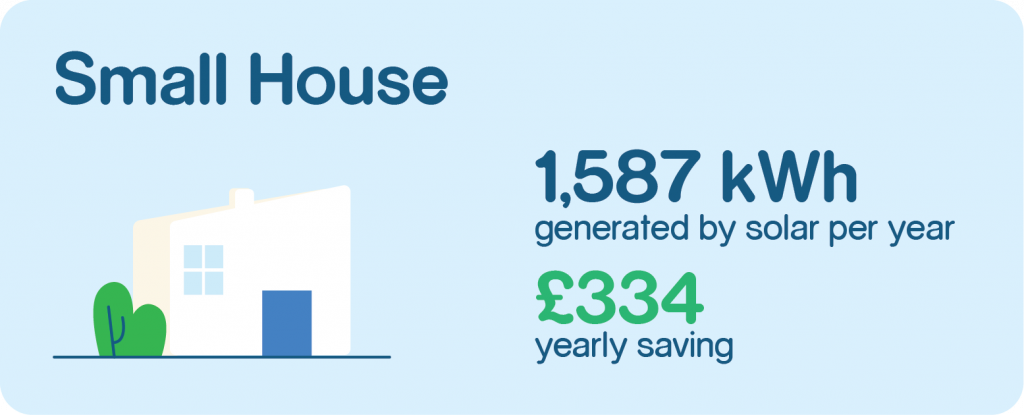
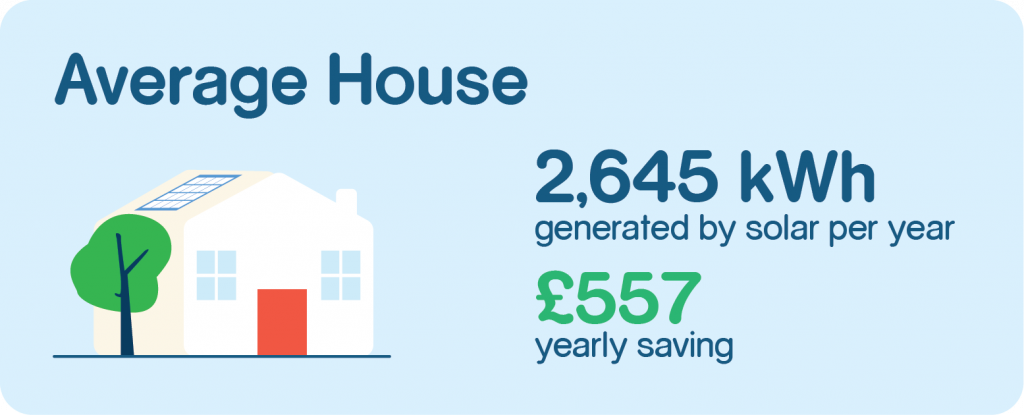
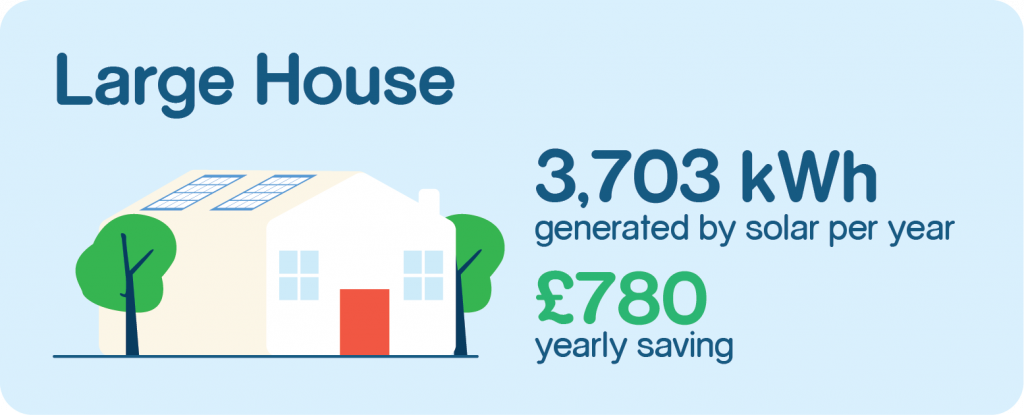
Solar panels typically reduce your electricity bill by 70%, resulting in annual savings ranging from £300 to £800 for most homes.
This calculation is based on the current electricity price (October-December 2023), the highest widely available Smart Export Guarantee rate (ScottishPower’s 12p per kWh tariff), and solar energy data sourced from the European Commission and MCS.
For an average three-bedroom household, this translates to an annual saving of £362, considering only half of the solar power generated by your panels is utilized. The remaining half is directed to the grid unless you either possess a solar battery – potentially adding another £122 to your savings – or participate in the Smart Export Guarantee (SEG).
The SEG program allows you to earn compensation for every kilowatt-hour (kWh) of solar-generated electricity sold to the National Grid. In the case of the typical three-bedroom household, SEG payments can amount to £159 per year. This results in a total annual benefit of £520 from combined grid savings and SEG revenues.
How much your household could save with solar panels will depend on these factors:
- The size of your solar panel system
- Your home’s electricity consumption
- Whether you use a significant amount of electricity during the day
- Your solar panels’ efficiency level
- Your Smart Export Guarantee rate
When will you break even on solar panels?
The typical household will reach the break-even point in 15.1 years.
Given that solar panels typically continue to function for at least another 10 years beyond this period, a three-bedroom household can ultimately accumulate a total profit of £5,151 from energy bill savings and SEG revenues, on average.
This study, along with the detailed calculations and graph below, involved extensive data analysis and mathematical modeling. For a comprehensive understanding of the intricacies, please refer to our full page: “Are Solar Panels Worth It?”
What makes up the cost of solar panel installation?
The cost of your solar panel installation will come down to how much your installer charges for materials, labour, and scaffolding.
Solar panel material costs: £2,100-£5,000
On average, purchasing materials, including panels, brackets, and an inverter, constitutes 40-50% of the total cost, amounting to £3,500 for the typical three-bedroom household.
The installation company typically applies a standard industry markup of around 30% to the base cost of these materials, adhering to common practices in this field and many others.
The cost of solar panels can be significantly influenced by the type chosen. Solar tiles, for instance, tend to be more expensive as they necessitate the replacement of the entire roof. In contrast, polycrystalline and thin-film panels are generally more cost-effective, albeit less efficient.
Solar panel business costs: £1,700-£3,900
Approximately 30-40% of the total cost is allocated to covering business expenses, encompassing regulatory approvals, vehicles, fuel, and scaffolding.
For a standard 3.5 kWp solar installation, this equates to approximately £2,800.
Solar panel labour costs: £900-£2,200
The remaining 10-30% of the expense is allocated to labor costs, covering all types of domestic installations, including larger ones involving more than 20 panels.
This represents excellent value, particularly when compared to the potential £3,000 extra cost of a DIY approach. Professionals, benefitting from trade pricing, make hiring them a more cost-effective option.
To avoid additional expenses, it is advisable to bypass salespersons who may add around 10%, approximately £790, to the overall cost. Obtain quotes directly from trusted installers using our free quote form.
How long does a solar panel installation take?
A standard solar panel installation is usually completed within one day.
For larger installations, defined as 14 panels or more, the process may extend to two or three days.
A significant portion of this timeline is dedicated to the meticulous construction of scaffolding. Therefore, there’s no need for concern if several hours pass and the panels have not yet been installed on your roof.
Are there ways to reduce the cost of solar panels?
There are multiple ways to reduce the cost of solar panels. Here are the main ones:
- The government’s ECO4 scheme
- The Smart Export Guarantee (SEG)
- Solar Together, a group-buying scheme
- The Home Energy Scotland Grant and Loan
- The Home Upgrade Grant
ECO4 may offer complimentary solar panels to eligible individuals receiving specific benefits and residing in electrically heated homes.
The government’s SEG initiative mandates major energy companies to compensate you for surplus solar-generated electricity that goes unused.
Alternatively, some individuals opt for a solar diverter to manage excess energy. This device directs unused electricity generated by solar panels toward a designated load or appliance.
Costs of solar panels can also be reduced through Solar Together, typically by 30-35%. This collective purchasing initiative is available to homeowners, small or medium-sized businesses, and tenants with landlord approval. By registering for free and participating in the scheme, solar panel installers bid for the job through an auction, with the lowest bid securing the project. You retain full ownership of the solar panel system at a reduced cost.
Residents in Scotland, including Edinburgh, Glasgow, or the Highlands, can leverage the Home Energy Scotland Grant and Loan to obtain solar panels. This program offers a loan of up to £6,000 with zero interest and a repayment period of at least five years. However, this is applicable only to packages combining solar panels with a heat pump or storage heaters.
The Home Upgrade Grant can potentially cover 100% of solar panel costs for low-income households off the gas grid with EPC ratings of D, E, F, or G.
For more information, check out our guide to Solar Panel Grants.
Additional solar panel costs
1. Solar panel inverter
The solar inverter plays a crucial role in a solar panel system, transforming electricity from direct current (DC) to alternating current (AC) for use in your home. Although solar panels typically endure 25-30 years, the inverter may require replacement around the 10-15 year mark. A replacement inverter typically incurs a cost ranging from £500 to £1,000.
2. Maintenance and repair
Solar panels rarely malfunction due to their lack of moving parts and robust surfaces designed to withstand adverse conditions, including hailstones as large as golf balls. Nevertheless, no system is entirely immune, and unforeseen incidents such as falling trees, stray cricket balls, severe weather, or damage from animals like squirrels can occur.
In the event of damage, it is crucial to engage the services of a professional solar panel repair company, as tampering with electrical equipment poses risks and often involves substantial costs. Minor breakages typically incur repair costs around £80, while more extensive repairs may reach up to £1,500.
3. Cleaning
Regular rainfall in the UK generally helps keep solar panels clean. However, rain is not very effective at removing bird droppings, which can hinder the efficiency of solar panels. If your TV aerial is situated directly above the solar panels, it may attract birds as a perch.
If you observe dirt accumulating on your solar panels, it’s advisable to consider cleaning them. This can be done by a professional service, typically costing around £100, or you can choose to undertake the cleaning yourself, if you follow our cleaning guide.
Related: How to pigeon-proof your solar panels
Six things to consider before buying solar panels
1. Is your roof suitable?
Should your roof be heavily shaded, it might not be an ideal location for solar panels. Ideally, the roof should face south, but an east or west-facing orientation can also suffice, positioned at an angle ranging from 10 to 60 degrees.
Want to learn more? Head to our page: What’s The Best Angle and Direction for Solar Panels?
2. Do you need a structural inspection of your roof?
A reputable installer will evaluate your roof’s condition and might suggest a structural survey. As long as your roof is in sound shape, it should easily support a standard 200 kg solar panel system.
3. What size solar panel system is right for you?
Examine your yearly electricity consumption and choose a system that produces sufficient power to fulfill your household requirements. A standard three-bedroom home usually requires a 3.5 kWp system, as it consumes around 2,700 kWh annually, but your residence may have unique needs.
4. Should you install a solar battery at the same time?
Solar batteries have the capability to store surplus electricity generated by your solar panels for future use. The cost of a battery is generally £4,500, offering an additional annual saving of around £122 for the average household.
Find out more about solar battery installation on our page.
5. Can you sell your excess energy instead?
You can sell the solar power you don’t use through the Smart Export Guarantee, and make £159 per year, on average.
Start setting this up in advance of installation, with the supplier who offers you the best price.
Next steps
Now that you’ve gained a comprehensive understanding of solar panels, along with associated costs, the next step is to obtain quotes for your own solar panels. Simply share some brief information about your property, and we’ll connect you with our skilled solar suppliers, who will furnish you with quotes for comparison.
Get FREE Solar Quotes
Find out how much a solar solution would cost you
Complete A Short Form – Receive Free Quotes – Compare & Save
Get FREE Solar Quotes
Find out how much a solar solution would cost you
Complete A Short Form – Receive Free Quotes – Compare & Save

